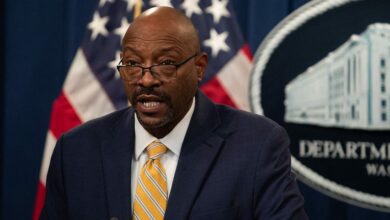North Carolina becomes latest state to pass bill banning trans athletes from girls’ sports teamsNorth Carolina becomes latest state to pass bill banning trans athletes from girls’ sports teams

The North Carolina House on Wednesday passed legislation that would prohibit biological males who identify as female from playing on girls’ sports teams in middle school, high school and college.
Lawmakers easily approved the Fairness in Women’s Sports Act, which would require athletes to play on teams that match their sex as determined by “reproductive biology and genetics at birth,” by a 73-39 vote, with three Democrats supporting the measure.
Republican state Rep. Tricia Cotham, who recently gave the GOP a veto-proof supermajority by announcing a high-profile defection from the Democratic Party, also voted in favor of the bill.
The legislation now moves to the state Senate, which is considering its own version of the same bill and also has a Republican supermajority. The state Senate could vote on its bill, which currently doesn’t impact college athletics, as soon as Thursday.
STATES ADVANCE BILLS PROTECTING GIRLS’ SPORTS AS BIDEN SAYS NO AT FEDERAL LEVEL
North Carolina currently allows transgender athletes to play sports based on their gender identity, although students who wish to do so must undergo a process that includes providing medical information.
Proponents of the latest bill argue they seek fairness and to protect girls in competition.
“This bill is a bill to be inclusive, not to be exclusive,” said Rep. Kristin Baker, a Republican and primary sponsor of the legislation. “This bill is to allow fair and particularly safe, physically safe, competition.”
Critics countered that such measures discriminate against transgender people and prevent them from living their lives.
“It is a pretext for bigotry and part of a larger effort to ban transgender people from living their lives,” Rep. Vernetta Alston, a Democrat, said during debate over the measure.
GOP MOVES TO ‘SAVE WOMEN’S SPORTS’: BILL BACKED BY RILEY GAINES HEADED FOR HOUSE VOTE
There have been 18 gender-waiver requests submitted to the North Carolina High School Athletic Association since its current policy was put in place before the 2019-20 school year, according to local NBC affiliate WRAL, which noted one request was incomplete and one was denied. Of the remaining 16 that were approved, 14 were biological females requesting to play on boys’ teams, while only two were biological males trying to compete against girls.
However, supporters of the bill point to the case of Payton McNabb, a high school senior in North Carolina who suffered a concussion and neck injury after a transgender athlete hit her in the head with a volleyball during a school match last September.
“I may be the first to come before you with an injury, but if this doesn’t pass, I won’t be the last,” she said in a committee meeting on Wednesday before the final House vote.
The debate drew national advocates like Riley Gaines, a former University of Kentucky swimmer and political activist who’s publicly opposed allowing biological males to compete against girls and women.
Armed with supermajorities, Republicans will likely be able to ensure a final version of the bill becomes law even if Democratic Gov. Roy Cooper vetoes it.
NORTH CAROLINA GOP GOES ON OFFENSE, PUSHING AMBITIOUS AGENDA WITH NEW SUPERMAJORITY IN STATE HOUSE
North Carolina is hardly alone in pushing legislation to keep biological males out of girls’ sports. At least 21 states have now imposed restrictions on transgender athletes, primarily with the intention of protecting girls by prohibiting biological males who identify as female from competing against them. And many additional states may soon join that list or expand their restrictions.
Across the country, a flurry of states has advanced similar bills that will likely become law with GOP-controlled legislatures.
At the federal level, meanwhile, the White House vowed Monday that President Biden will veto a Republican-backed bill that would prevent biological males from participating in women’s sports should it pass both houses of Congress.
The administration strongly opposes House passage of H.R. 734,” the White House said in a statement. “For students nationwide, participating in sports and being part of a team is an important part of growing up, staying engaged in school, and learning leadership and life skills. H.R. 734 would deny access to sports for many families by establishing an absolute ban on transgender students — even those as young as elementary schoolers — playing on a team consistent with their gender identity.”
‘THAT IS A FRAUD’: GOV. DESANTIS CALLS OUT LIA THOMAS, BIOLOGICAL MEN COMPETING IN WOMEN’S SPORTS
“Schools, coaches, and athletic associations around the country are already working with families to develop participation rules that are fair and that take into account particular sports, grade levels, and levels of competition,” the White House statement continued. “As a national ban that does not account for competitiveness or grade level, H.R. 734 targets people for who they are and therefore is discriminatory.”
Earlier this month, the Biden administration proposed a new rule that bars outright blanket bans of trans athletes from competing on sports teams that match their gender identity.
The proposal, which must undergo a period of public comment, would prohibit states or school districts from enacting one-size-fits-all policies that “categorically” impose such bans. However, it leaves some wiggle room to limit transgender athletes’ participation in sports if it’s deemed to undermine competitive fairness. The proposal also allows restrictions relating to “important educational objectives” like reducing the risk of injuries.
Pro-trans and LGBTQ advocates argue the administration’s rule is too restrictive and creates guidelines for schools to legally ban transgender athletes.
Beyond athletics, state lawmakers nationwide have been pushing a number of bills affecting transgender individuals. This year alone, legislators have introduced more than 400 such bills, dwarfing numbers from recent years. Many of these measures, especially those placing restrictions on gender transition procedures for children and the teaching of gender identity in the classroom, have triggered protests across the country.
The North Carolina House on Wednesday passed legislation that would prohibit biological males who identify as female from playing on girls’ sports teams in middle school, high school and college.
Lawmakers easily approved the Fairness in Women’s Sports Act, which would require athletes to play on teams that match their sex as determined by “reproductive biology and genetics at birth,” by a 73-39 vote, with three Democrats supporting the measure.
Republican state Rep. Tricia Cotham, who recently gave the GOP a veto-proof supermajority by announcing a high-profile defection from the Democratic Party, also voted in favor of the bill.
The legislation now moves to the state Senate, which is considering its own version of the same bill and also has a Republican supermajority. The state Senate could vote on its bill, which currently doesn’t impact college athletics, as soon as Thursday.
STATES ADVANCE BILLS PROTECTING GIRLS’ SPORTS AS BIDEN SAYS NO AT FEDERAL LEVEL
North Carolina currently allows transgender athletes to play sports based on their gender identity, although students who wish to do so must undergo a process that includes providing medical information.
Proponents of the latest bill argue they seek fairness and to protect girls in competition.
“This bill is a bill to be inclusive, not to be exclusive,” said Rep. Kristin Baker, a Republican and primary sponsor of the legislation. “This bill is to allow fair and particularly safe, physically safe, competition.”
Critics countered that such measures discriminate against transgender people and prevent them from living their lives.
“It is a pretext for bigotry and part of a larger effort to ban transgender people from living their lives,” Rep. Vernetta Alston, a Democrat, said during debate over the measure.
GOP MOVES TO ‘SAVE WOMEN’S SPORTS’: BILL BACKED BY RILEY GAINES HEADED FOR HOUSE VOTE
There have been 18 gender-waiver requests submitted to the North Carolina High School Athletic Association since its current policy was put in place before the 2019-20 school year, according to local NBC affiliate WRAL, which noted one request was incomplete and one was denied. Of the remaining 16 that were approved, 14 were biological females requesting to play on boys’ teams, while only two were biological males trying to compete against girls.
However, supporters of the bill point to the case of Payton McNabb, a high school senior in North Carolina who suffered a concussion and neck injury after a transgender athlete hit her in the head with a volleyball during a school match last September.
“I may be the first to come before you with an injury, but if this doesn’t pass, I won’t be the last,” she said in a committee meeting on Wednesday before the final House vote.
The debate drew national advocates like Riley Gaines, a former University of Kentucky swimmer and political activist who’s publicly opposed allowing biological males to compete against girls and women.
Armed with supermajorities, Republicans will likely be able to ensure a final version of the bill becomes law even if Democratic Gov. Roy Cooper vetoes it.
NORTH CAROLINA GOP GOES ON OFFENSE, PUSHING AMBITIOUS AGENDA WITH NEW SUPERMAJORITY IN STATE HOUSE
North Carolina is hardly alone in pushing legislation to keep biological males out of girls’ sports. At least 21 states have now imposed restrictions on transgender athletes, primarily with the intention of protecting girls by prohibiting biological males who identify as female from competing against them. And many additional states may soon join that list or expand their restrictions.
Across the country, a flurry of states has advanced similar bills that will likely become law with GOP-controlled legislatures.
At the federal level, meanwhile, the White House vowed Monday that President Biden will veto a Republican-backed bill that would prevent biological males from participating in women’s sports should it pass both houses of Congress.
The administration strongly opposes House passage of H.R. 734,” the White House said in a statement. “For students nationwide, participating in sports and being part of a team is an important part of growing up, staying engaged in school, and learning leadership and life skills. H.R. 734 would deny access to sports for many families by establishing an absolute ban on transgender students — even those as young as elementary schoolers — playing on a team consistent with their gender identity.”
‘THAT IS A FRAUD’: GOV. DESANTIS CALLS OUT LIA THOMAS, BIOLOGICAL MEN COMPETING IN WOMEN’S SPORTS
“Schools, coaches, and athletic associations around the country are already working with families to develop participation rules that are fair and that take into account particular sports, grade levels, and levels of competition,” the White House statement continued. “As a national ban that does not account for competitiveness or grade level, H.R. 734 targets people for who they are and therefore is discriminatory.”
Earlier this month, the Biden administration proposed a new rule that bars outright blanket bans of trans athletes from competing on sports teams that match their gender identity.
The proposal, which must undergo a period of public comment, would prohibit states or school districts from enacting one-size-fits-all policies that “categorically” impose such bans. However, it leaves some wiggle room to limit transgender athletes’ participation in sports if it’s deemed to undermine competitive fairness. The proposal also allows restrictions relating to “important educational objectives” like reducing the risk of injuries.
Pro-trans and LGBTQ advocates argue the administration’s rule is too restrictive and creates guidelines for schools to legally ban transgender athletes.
Beyond athletics, state lawmakers nationwide have been pushing a number of bills affecting transgender individuals. This year alone, legislators have introduced more than 400 such bills, dwarfing numbers from recent years. Many of these measures, especially those placing restrictions on gender transition procedures for children and the teaching of gender identity in the classroom, have triggered protests across the country.
Latest Political News on Fox News [#item_full_content]





